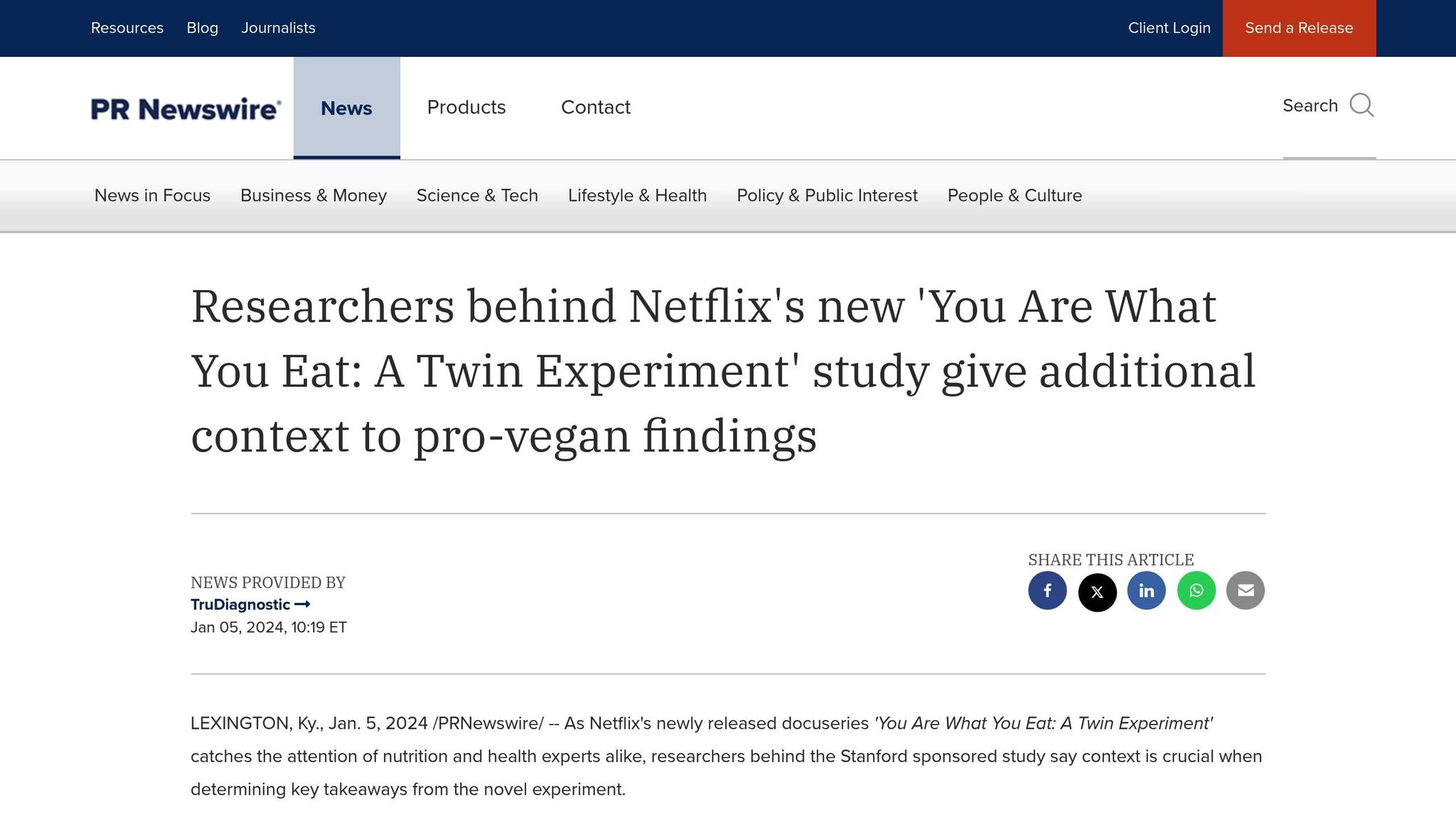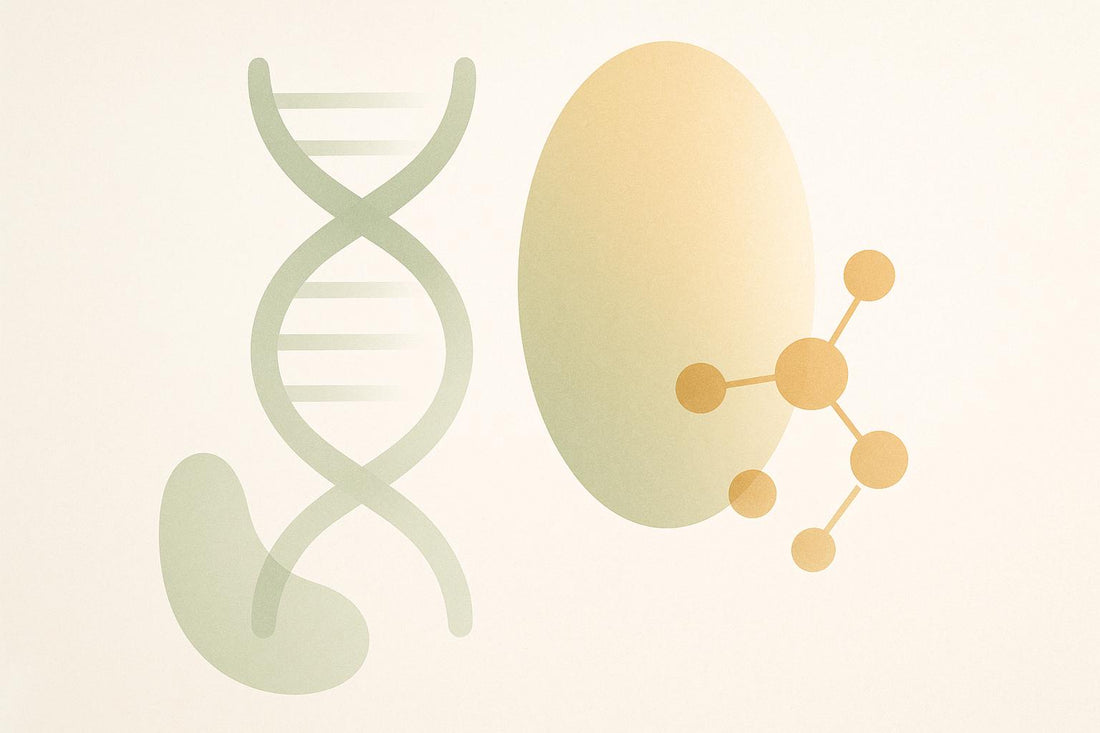Can what you eat slow down aging? Research says yes. Plant-based diets may help reduce biological aging by influencing DNA methylation and supporting cellular repair. Here's a quick summary of how plant-based eating can impact your genes and aging:
- Key Benefits: Improves DNA methylation, reduces inflammation, and supports cellular repair.
- How It Works: Nutrients like polyphenols, folate, and fiber interact with your gut microbiome to maintain youthful gene expression.
- Supplements That Help: NMN, Resveratrol, Spermidine, and Fisetin can boost these effects, especially for those over 40.
Eating more fruits, vegetables, whole grains, and legumes doesn’t just fuel your body - it may keep your cells younger, longer. Combine this with targeted supplements to maximize results.
Research Results: Plant-Based Diets and Epigenetic Aging
Key Findings from Recent Studies
Studies suggest that plant-based diets can positively influence biological age by aiding DNA methylation and promoting cellular repair. Diets rich in fruits, vegetables, whole grains, and legumes have been linked to better cellular function. This highlights the potential role of plant-based eating in supporting healthier aging.
Combining Nutrition with Supplements for Better Results
Building on these findings, researchers are investigating how specific supplements can enhance the effects of plant-based diets. Evidence suggests that combining plant-based nutrition with supplements like NMN, Resveratrol, Spermidine, and Fisetin - such as those offered by MASI Longevity Science (https://masi.eu) - may improve cellular repair, mitochondrial efficiency, and DNA methylation. This approach could be especially beneficial for individuals over 40, aiming to boost cellular strength and maintain vitality.
Although still in early stages, this combined strategy shows promise for promoting long-term health and supporting youthful energy levels.
How Plant-Based Foods Change Epigenetic Markers
Nutrients and DNA Methylation
Plant-based foods are packed with compounds that can influence DNA methylation, a process critical for gene regulation and cellular repair. These compounds work through various pathways to support healthy cellular functions.
Take polyphenols, for example. These compounds, found in fruits and vegetables, help maintain a balanced DNA methylation process. Then there’s folate - a nutrient abundant in leafy greens, legumes, and whole grains - that acts as a methyl donor, ensuring proper methylation patterns. This balance is essential for repairing cells and slowing down premature aging.
Fiber also plays an important role. When fermented in the gut, fiber produces short-chain fatty acids (SCFAs). These SCFAs can inhibit histone deacetylases, enzymes that influence gene expression, helping to sustain youthful epigenetic patterns. Plus, they create a gut environment primed for further epigenetic benefits.
In short, plant-based nutrients don’t just fuel your body - they also refine how your genes function.
Microbiome Effects on Epigenetics
Your gut microbiome acts as a bridge between the foods you eat and changes in your epigenetic markers. A diet rich in plant-based foods supports a diverse microbiome, which, in turn, influences gene regulation.
When you eat a variety of plants, your gut bacteria produce metabolites that directly impact epigenetics. These include:
- B-vitamins: Synthesized by gut bacteria using plant fiber
- Antioxidants: Created from metabolizing plant compounds
- Bioactive peptides: Generated through bacterial fermentation
This connection is especially important for managing inflammation and oxidative stress - two factors that significantly affect biological aging. A healthy gut microbiome, supported by plant-based foods, keeps inflammation in check and minimizes oxidative damage, which can otherwise speed up aging at the epigenetic level.
Studies show that people who eat a diverse range of plants tend to have more beneficial gut bacteria. These bacteria break down plant compounds into metabolites that support healthy DNA methylation, potentially slowing biological aging. In other words, what you eat doesn’t just fuel your body - it may also help keep your genes in balance.
Health Benefits and Applications
Supporting Overall Health
Plant-based diets play a key role in maintaining cellular health, balancing metabolism, and supporting heart function. These diets are known to enhance mitochondrial activity, manage inflammation, minimize oxidative stress, and assist in DNA repair.
Specific plant compounds are particularly effective in boosting mitochondrial activity and controlling inflammation. To make the most of these effects, adding the right supplements can help strengthen and extend the body’s natural defenses.
Pairing Diet with Supplements
MASI Longevity Science offers high-quality supplements designed to work alongside a nutrient-dense, plant-based diet. For tailored support, MASI suggests an age-specific supplementation plan:
| Age Group | Recommended Daily Intake |
|---|---|
| 40–50 years | 1 capsule daily |
| 50+ years | 2 capsules daily |
MASI supplements target critical aspects of aging with key ingredients:
- NMN: Supports cellular energy and vitality
- Resveratrol: Activates the SIRT1 gene linked to youthfulness
- Spermidine: Promotes healthy cell functions
- Fisetin: Aids in cellular renewal
These supplements are produced in Germany using premium raw materials and undergo independent testing in Switzerland to ensure purity, safety, and effectiveness. They are vegan-friendly and free from common allergens. When combined with a variety of plant-based foods, MASI supplements offer strong support for healthy aging at the cellular level.
sbb-itb-4f17e23
Eat THIS for Healthy Genes: Epinutrition and the Netflix Vegan Study

Summary: Plant-Based Diets for Better Aging
Research indicates that plant-based diets can influence epigenetic markers, helping reduce inflammation and oxidative stress. This, in turn, supports DNA methylation and aids in cellular repair, promoting healthier aging.
Plant-based foods are rich in bioactive compounds that influence cellular functions. MASI Longevity Science has developed supplements designed to complement these diets, enhancing their natural benefits:
| Supplement | Dosage | Key Function |
|---|---|---|
| NMN | 1,000 mg | Restores cellular energy |
| Resveratrol | 500 mg | Activates SIRT1 gene |
| Spermidine | 3 mg | Supports weight loss mechanisms, slows aging |
| Fisetin | 500 mg | Removes senescent cells, renewing the body |
For adults aged 40–50, the recommendation is one capsule daily. Those over 50 are advised to take two capsules daily. These supplements are produced in Germany and undergo independent testing in Switzerland to ensure purity and effectiveness.
"NMN - the king of longevity Restores vitality in every cell." - MASI Longevity Science [1]
FAQs
How can plant-based diets affect DNA methylation and help slow biological aging?
Plant-based diets have been shown to positively influence DNA methylation, a key process in epigenetics that can impact how genes are expressed over time. Recent studies suggest that consuming a diet rich in fruits, vegetables, whole grains, nuts, and legumes may help reduce biological age by promoting healthier methylation patterns. These patterns are associated with improved cellular function and reduced markers of aging.
Additionally, plant-based diets are high in antioxidants, vitamins, and polyphenols, which support overall cellular health and combat oxidative stress - another factor linked to aging. While further research is ongoing, adopting a plant-based diet could be a proactive step toward supporting longevity and vitality.
How does the gut microbiome influence the connection between plant-based diets and epigenetic aging?
The gut microbiome plays a key role in the relationship between plant-based diets and epigenetic aging. A diet rich in plant-based foods, such as fruits, vegetables, whole grains, and legumes, promotes a diverse and healthy gut microbiome. This diversity supports the production of beneficial compounds like short-chain fatty acids (SCFAs), which have been linked to reduced inflammation and improved cellular health.
Research suggests that these positive changes in the gut microbiome can influence epigenetic markers, potentially slowing biological aging. By fostering a balanced microbiome, plant-based diets may help regulate gene expression in ways that support longevity and overall health.
Can supplements like NMN, Resveratrol, Spermidine, and Fisetin enhance the anti-aging benefits of a plant-based diet, and are they suitable for everyone?
Supplements such as NMN, Resveratrol, Spermidine, and Fisetin can complement the benefits of a plant-based diet by targeting key factors of aging, like cellular renewal and vitality. These compounds are known to support heart and brain health, while also promoting overall longevity.
However, supplements may not be necessary for everyone. They are often recommended for individuals over 40 or those looking to enhance their energy levels and reduce age-related risks. Whether they’re right for you depends on your personal health goals, age, and lifestyle. Consulting with a healthcare professional can help determine the best approach for your needs.




